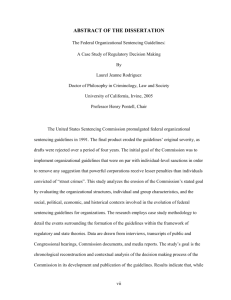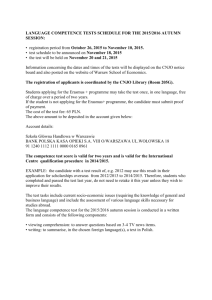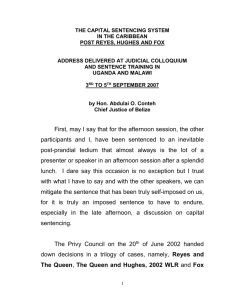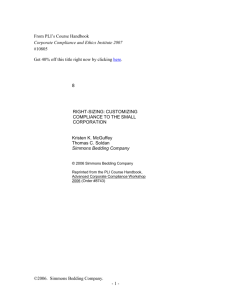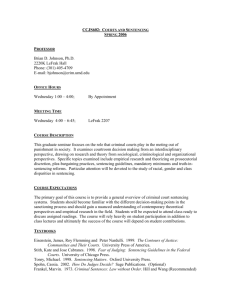Letter dated 10 May 2007 from Lord Grenfell to the Rt
advertisement
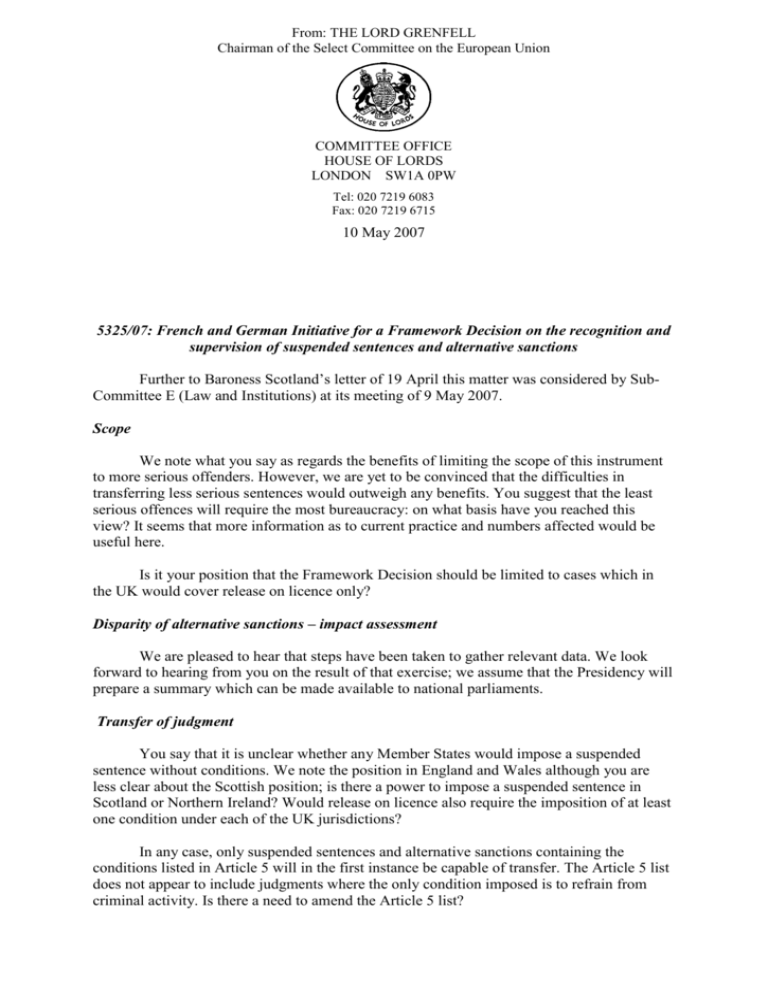
From: THE LORD GRENFELL Chairman of the Select Committee on the European Union COMMITTEE OFFICE HOUSE OF LORDS LONDON SW1A 0PW Tel: 020 7219 6083 Fax: 020 7219 6715 10 May 2007 5325/07: French and German Initiative for a Framework Decision on the recognition and supervision of suspended sentences and alternative sanctions Further to Baroness Scotland’s letter of 19 April this matter was considered by SubCommittee E (Law and Institutions) at its meeting of 9 May 2007. Scope We note what you say as regards the benefits of limiting the scope of this instrument to more serious offenders. However, we are yet to be convinced that the difficulties in transferring less serious sentences would outweigh any benefits. You suggest that the least serious offences will require the most bureaucracy: on what basis have you reached this view? It seems that more information as to current practice and numbers affected would be useful here. Is it your position that the Framework Decision should be limited to cases which in the UK would cover release on licence only? Disparity of alternative sanctions – impact assessment We are pleased to hear that steps have been taken to gather relevant data. We look forward to hearing from you on the result of that exercise; we assume that the Presidency will prepare a summary which can be made available to national parliaments. Transfer of judgment You say that it is unclear whether any Member States would impose a suspended sentence without conditions. We note the position in England and Wales although you are less clear about the Scottish position; is there a power to impose a suspended sentence in Scotland or Northern Ireland? Would release on licence also require the imposition of at least one condition under each of the UK jurisdictions? In any case, only suspended sentences and alternative sanctions containing the conditions listed in Article 5 will in the first instance be capable of transfer. The Article 5 list does not appear to include judgments where the only condition imposed is to refrain from criminal activity. Is there a need to amend the Article 5 list? You refer to the voluntary nature of this Framework Decision. However, in our view it is not clear how the mechanism would operate. Recital 10 does not make any reference to the voluntary nature of the process. Article 5 simply states that a judgment “may be transferred”: is this decision entirely within the discretion of the sentencing State (subject to the right of the executing State to refuse to recognise and supervise under Article 9)? Is the consent of the convicted person required? Fundamental rights As you may be aware, in the context of our inquiry into the European Supervision Order, witnesses have raised the question of the need for hearings at the various stages in the procedure. We find it alarming that you suggest that in some Member States no hearing would be required prior to revocation of a suspension of sentence as this appears to us to raise potentially significant Article 6 ECHR concerns. Where the Framework Decision fails to provide for hearings, are Member States expected to “fill the gaps” when implementing the Framework Decision to ensure compliance with their obligations under the ECHR (we note the terms of Recital 5 and Article 3)? Grounds for refusal to recognise judgment You say that without a provision allowing Member States to refuse to recognise and supervise on grounds of age, the instrument would be unworkable. On what grounds do you reach this conclusion? It is not clear why you consider that the voluntary nature of the process has a bearing on whether grounds for refusal to recognise should be discretionary or mandatory. The European Supervision Order, for example, appears also to be “voluntary” in the sense in which you use the term here, but Member States are obliged to refuse to execute where execution would infringe ne bis in idem (Article 10 of the ESO proposal). Competence for subsequent decisions We are grateful for the clarification as to the need for reservation of competence in certain cases. In light of what you say, we agree that inclusion of conditional sentencing measures in the scope of the present Framework Decision may raise some difficulties. We trust that the Government will explore the problems raised and seek a solution. While we consider that competence should not be reserved wherever possible, it may on balance be more appropriate to include conditional sentence arrangements on the basis of reserved competence than to exclude them altogether. Revocation of suspension We note that there is a lack of clarity regarding the operation of Article 15. It appears that, as currently drafted, the sentencing State could order the imposition of a sentence or the revocation of a suspension without issuing an enforcement order or arrest warrant to return the convicted person to its territory. The effect in the executing State of the sentencing State’s order in such cases requires some attention should the possibility of reserving competence remain. The Framework Decision is retained under scrutiny. I am copying this letter to Michael Connarty MP, Chairman of the Commons European Scrutiny Committee; and to Alistair Doherty, Clerk to the Commons Committee; Michael Carpenter, Legal Adviser to the Commons Committee; Les Saunders (Cabinet Office); and Deirdre Boylan, Departmental Scrutiny Co-ordinator. GRENFELL Rt Hon David Hanson MP Minister of State Ministry of Justice 7.11 Selborne House 54 Victoria Street London SW1E 6QW


